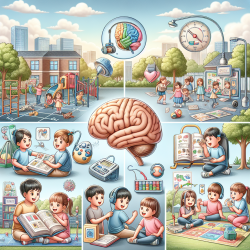As practitioners dedicated to enhancing the communication skills of children, it is crucial to leverage evidence-based interventions. A recent randomized controlled trial (RCT) published in the International Journal of Language & Communication Disorders provides compelling data on improving narrative and vocabulary skills in secondary school students with language disorders. This study, conducted by Victoria L. Joffe et al., underscores the potential of teaching assistant (TA)-delivered interventions in mainstream secondary schools.
The study evaluated the efficacy of narrative and vocabulary interventions delivered by TAs over six weeks. The interventions included three groups: narrative, vocabulary, and a combined narrative and vocabulary group. The results revealed significant improvements in narrative skills across all intervention groups, although vocabulary gains were more nuanced.
Key Findings
- All three intervention groups (narrative, vocabulary, combined) showed significant improvements in narrative skills compared to the control group.
- The combined narrative and vocabulary group demonstrated the most consistent gains in both narrative and vocabulary tasks.
- Vocabulary improvements were primarily observed in intervention-specific measures rather than standardized tests.
Implementing Narrative Interventions
The study highlights the effectiveness of structured narrative interventions. Here are actionable steps for practitioners:
- Storytelling Exercises: Use sequenced picture stories to help students generate and recall narratives.
- Story Generation Tasks: Encourage students to create stories using a set of pictures or objects, focusing on narrative structure and coherence.
- Explicit Narrative Instruction: Teach students about story components such as setting, characters, plot, and resolution.
Enhancing Vocabulary Skills
Although vocabulary gains were less pronounced in standardized measures, intervention-specific tasks showed improvement. Practitioners can employ the following strategies:
- Thematic Vocabulary Instruction: Focus on curriculum-relevant themes, using mind-mapping and word-building activities.
- Interactive Quizzes and Games: Reinforce vocabulary learning through engaging activities that test word knowledge and usage.
- Idiomatic and Figurative Language: Teach idioms and figurative expressions to enhance students' comprehension and expressive skills.
Training and Utilizing Teaching Assistants
The study underscores the role of TAs in delivering effective language interventions. Practitioners should:
- Provide Comprehensive Training: Ensure TAs receive thorough training in language intervention strategies and narrative techniques.
- Ongoing Support: Offer continuous support and feedback to TAs to maintain intervention fidelity and effectiveness.
In conclusion, the findings from Joffe et al.'s study provide robust evidence for the efficacy of TA-delivered narrative interventions in secondary schools. By implementing these evidence-based strategies, practitioners can significantly enhance the narrative and vocabulary skills of students with language disorders.
To read the original research paper, please follow this link: Improving storytelling and vocabulary in secondary school students with language disorder: a randomized controlled trial.










